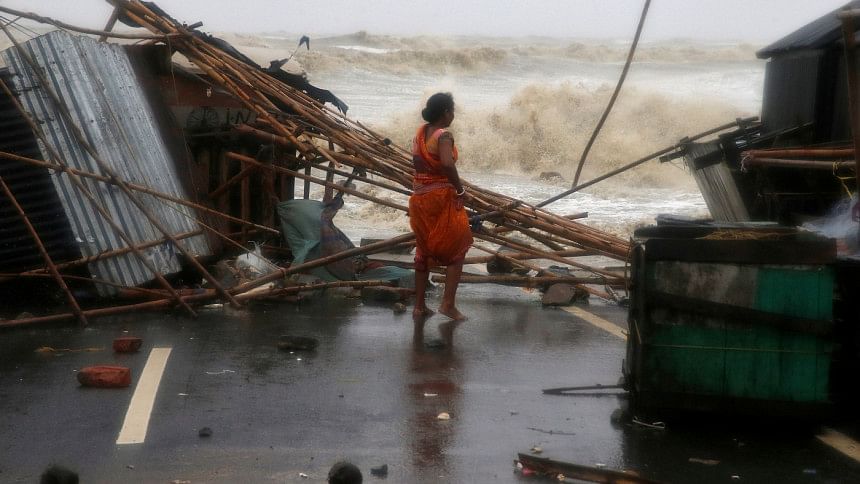Climate change takes heavy toll on mental health in Bangladesh

As Ripon Mondal's family try to recover from the drought that ruined their watermelon crop in central Bangladesh last year, the 19-year-old college student fears that his father's financial worries are just the tip of the iceberg.
"I can feel my father's mental distress," said Mondal.
"He has to pay for our studies, and sometimes I feel terrible about the debts piling up."
The family lives in a village in the Kamarkhola Union area, which is surrounded by four rivers, leaving them far from any mental health services - a reality faced by many people in Bangladesh, especially those in rural and remote parts.
"I would have to cross at least two rivers and travel a long distance to reach a hospital where I can find a psychologist," Mondal said.
As Bangladesh faces worsening climate change impacts on a warming planet - from droughts and floods to sea level rise and storms - health professionals and organisations in the country are increasingly concerned about deteriorating mental health.
Extreme weather and climate disasters can cause or compound anxiety and depression, for example, according to mental health specialists who say such conditions are poorly understood in Bangladesh and that there are far too few trained psychologists.
Nearly a fifth of adults in Bangladesh have mental health issues, found a survey conducted by the government in 2019.
In a first-of-its-kind study for Bangladesh - funded by the World Bank and published in the journal Lancet Planetary Health in February - researchers found that exposure to higher temperatures and humidity along with worsening floods raised the likelihood of people suffering from both anxiety and depression.
Yet the country of about 170 million people has just a few hundred mental health practitioners, according to Syed Tanveer Rahman, a psychology professor at the University of Dhaka.
"When one steps beyond large cities like Dhaka, access to mental health care is still quite limited," said Rahman.
Officials at the National Institute of Mental Health (NIMH) did not respond to requests for comment on the situation.
The government has recognised the toll climate change can take on mental health, and its 2022 adaptation plan pledged to monitor the issue - with a focus on women and disabled people.
Mental health professionals, NGOs and even start-ups say they are trying to improve the situation - by using technology and training volunteers to help rural and isolated communities.
For example, Moner Bondhu is a for-profit mental healthcare platform which has partnered with the U.N. Development Programme to provide psychological aid to people in Dacope, one of the most remote and climate-vulnerable parts of the southern coast.
Disasters have now become so frequent in the area that residents do not have time to cope with the losses and damage incurred from one before another strikes, according to Moner Bondhu's CEO Tawhida Shiropa, who founded the start-up in 2016.
"We usually understand resilience as building back the physical assets and infrastructure, but disasters hit minds too, and in multiple ways," she told the Thomson Reuters Foundation.
CLIMATE ANXIETY CONNECTED TO SOCIOECONOMIC SITUATION
Globally, growing scrutiny of and studies on the link between climate change impacts and mental health condition have given rise to terms such as "climate anxiety" and "eco-grief".
Sally Weintrobe, a longstanding member of the Climate Psychology Alliance - a professional group based in Britain - said psychological responses to climate disasters from hurricanes to flooding can be shaped by how people relate to each other within their community, and what resources they have.
People from poorer and climate-vulnerable nations like Bangladesh "are not only victimised, but are also the ones who lack the resources to rebuild their lives," said Weintrobe.
By 2050, 13 million people in Bangladesh could be uprooted within the country by climate change, the World Bank has warned.
Psychologists in Bangladesh said the grief and anxiety caused by climate change often comes from an overwhelming sense of helplessness rooted in communities' economic situation.
"The poor - whose livelihoods are already fragile and whose access to government support is limited - live on under threats looming in the horizon," said Rahman of the University of Dhaka.
Furthermore, there is still a lot of stigma around mental health issues and treatment, and people - especially in rural areas - often turn to traditional medicine and healers for help.
Depon Chandra Sarker, a child psychologist at the Patuakhali Medical College, a government institution, said that seeking support for mental health problems is still rare in local communities "unless someone gets really out of control".
BRIDGING THE MENTAL HEALTH GAP WITH TECHNOLOGY
In remote parts of Bangladesh - including the disaster-prone south - most of the district and sub-district hospitals lack any mental health professionals, according to Sarker.
To tackle this scarcity, the government and NGOs often run mental health campaigns where psychotherapists visit remote communities and provide information and counselling. But one-off initiatives do not always work for climate-hit communities in need of longer-term support, several psychologists said.
Putting technology to good use is seen as one solution.
The country's climate adaptation plan recommends extending telehealth services - delivered over the phone or online - for people whose mental health is affected by climate change.
The start-up Moner Bondhu is already training volunteers at the grassroots level who can put people needing climate-related psychological support in touch with a counsellor by phone.
Meanwhile, some government-employed professionals - such as Bagerhat-based psychiatrist Mehedi Hasan - hold meetings on Zoom to educate health workers and emergency responders about the mental health care disaster-hit people may need.
"You cannot make a clean slate of the world's hazards causing you stress," said Hasan. "The point for the most vulnerable is how to remain functional despite them."

 For all latest news, follow The Daily Star's Google News channel.
For all latest news, follow The Daily Star's Google News channel. 








Comments